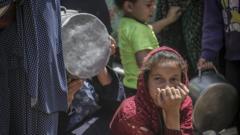Israel's blockade of Gaza continues to draw harsh criticism from humanitarian organizations and global observers, as the UN refugee agency (UNRWA) warns that denial of food has become a deliberate strategy in the ongoing conflict. Pascal Hundt of the International Committee of the Red Cross described the dire living conditions faced by civilians, who struggle for survival amid airstrikes, displacement, and a complete halt of humanitarian aid, including food and medical supplies.
Since March of this year, the humanitarian situation has drastically worsened following the resumption of hostilities by Israel after breaking a ceasefire. With the blockade in place, reports indicate that Israel has cut off aid supplies, worsening the plight of Palestinians who are now forced into even smaller living areas. Philippe Lazzarini, the UNRWA commissioner-general, highlighted the escalating crisis, stating that starvation is spreading, and without immediate aid, the humanitarian situation could lead to a catastrophic famine impacting children and vulnerable mothers.
Estimations from Integrated Food Security Phase Classification (IPC) indicate that 470,000 Gazans, about 22% of the population, are currently in a state of extreme food insecurity, designated as "Phase 5 – catastrophe." This phase reflects a scenario where households experience extreme lack of food, malnutrition, and face potential death. Shockingly, as many as 71,000 children are projected to require urgent nutritional intervention.
Lazzarini has asserted that the tactics employed by Israel, including food deprivation, amount to a war crime. He stated, “This is the weaponization of humanitarian aid,” while asserting that the conditions could potentially fall under international definitions of genocide due to the massive loss of life and targeted destruction of community resources.
The Israeli government remains firm in its belief that the blockade serves as a strategic pressure point against Hamas, with officials such as Defence Minister Israel Katz acknowledging that halting humanitarian aid is a tactic aimed at forcing compliance from the militant group. However, Israeli military families and dissident reservists have expressed their discontent with strategies that prioritize governmental survival over humanitarian considerations.
As the international community grapples with responses, there are calls for legal accountability against those perpetuating the humanitarian crisis, with discussions surrounding war crimes and potential classification of genocide gaining momentum. Amid ongoing discussions, there’s a growing fear that the blockade and violence could lead to long-standing repercussions in the region, leaving a once-thriving population on the brink of annihilation.
With no resolution in sight and critical global scrutiny mounting, the humanitarian crisis in Gaza demands urgent action to avert catastrophic consequences for an entire generation caught in the crossfire.
Since March of this year, the humanitarian situation has drastically worsened following the resumption of hostilities by Israel after breaking a ceasefire. With the blockade in place, reports indicate that Israel has cut off aid supplies, worsening the plight of Palestinians who are now forced into even smaller living areas. Philippe Lazzarini, the UNRWA commissioner-general, highlighted the escalating crisis, stating that starvation is spreading, and without immediate aid, the humanitarian situation could lead to a catastrophic famine impacting children and vulnerable mothers.
Estimations from Integrated Food Security Phase Classification (IPC) indicate that 470,000 Gazans, about 22% of the population, are currently in a state of extreme food insecurity, designated as "Phase 5 – catastrophe." This phase reflects a scenario where households experience extreme lack of food, malnutrition, and face potential death. Shockingly, as many as 71,000 children are projected to require urgent nutritional intervention.
Lazzarini has asserted that the tactics employed by Israel, including food deprivation, amount to a war crime. He stated, “This is the weaponization of humanitarian aid,” while asserting that the conditions could potentially fall under international definitions of genocide due to the massive loss of life and targeted destruction of community resources.
The Israeli government remains firm in its belief that the blockade serves as a strategic pressure point against Hamas, with officials such as Defence Minister Israel Katz acknowledging that halting humanitarian aid is a tactic aimed at forcing compliance from the militant group. However, Israeli military families and dissident reservists have expressed their discontent with strategies that prioritize governmental survival over humanitarian considerations.
As the international community grapples with responses, there are calls for legal accountability against those perpetuating the humanitarian crisis, with discussions surrounding war crimes and potential classification of genocide gaining momentum. Amid ongoing discussions, there’s a growing fear that the blockade and violence could lead to long-standing repercussions in the region, leaving a once-thriving population on the brink of annihilation.
With no resolution in sight and critical global scrutiny mounting, the humanitarian crisis in Gaza demands urgent action to avert catastrophic consequences for an entire generation caught in the crossfire.



















